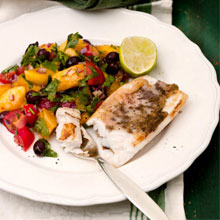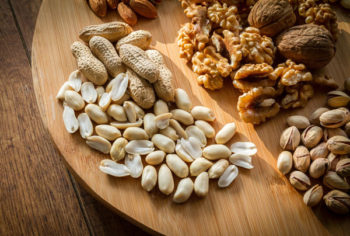What you put on your plate can make a difference to your risk of developing that devastating condition, dementia.
ALSO SEE: How To Talk To Someone With Dementia
Few diseases arouse more dread than dementia as we get older. It’s not surprising – doctors still can’t prevent it and there are few, if any, really effective treatments. But this could change. In fact, according to the recipe book, Healthy Eating to Reduce the Risk of Dementia, a healthy mid-life diet could help reduce your risk of dementia. This book examines scientific evidence and uses this to make practical recommendations and recipes. Because brain changes can begin up to 20 years before dementia symptoms even start to appear, there is no better time to take a look at what we put on our plates than now. Read on to discover the simple steps to take that could help your brain stay firing on all cylinders, no matter your age or stage of life.
“Food synergy” is the latest catchphrase. For years, scientists have tried to nail the disease-fighting properties of different nutrients by giving them in supplement form in clinical trials, only to face huge disappointment when they have not performed as expected. Dementia is a case in point. Trials of certain omega 3s have repeatedly failed to hit the mark, even though eating oily fish, which is rich in them, appears to protect the brain. And the same applies to other nutrients. So what’s going on? Partly, trials don’t go on long enough to detect effects. But the biggest reason is that we simply don’t eat isolated nutrients that could have brain-protecting qualities, such as vitamin B, D and E, selenium and zinc. These nutrients come wrapped up with all sorts of other goodies in food. And different foods, in turn, form part of our overall diet. The truth is, no single supplement can mimic the synergy between the myriad nutrients and other compounds that various foods contain: the fact remains that the whole is very definitely greater than each individual part. So what should be on your menu for good brain health?
ALSO SEE: 5 Brain Health Habits To Avoid Stress At Work
Regular w&h contributor Patsy Westcott is co-author with professor of nutritional medicine, Margaret Rayman, and dieticians Vanessa Ridland and Katie Sharpe, of Healthy Eating to Reduce the Risk of Dementia (Kyle Books). It includes details about various food, nutrients and dietary patterns that are thought to best protect your brain from the effects of ageing, as well as 100 delicious recipes based on the existing research.
Dish Up Some Fish
Do your brain a favour and put seafood on the menu once to four times a week. Oily fish, such as herring, salmon, pilchards and sardines, are rich in DHA (a long-chain omega 3 that’s abundant in brain tissue), which, according to a study published in The Journal of Immunology, is thought to have important anti-inflammatory properties. Our brains need long-chain omega 3s, which are better processed by the body than short-chain omega 3s, as they also help keep synapses in a fluid state, allowing for fast communication between brain cells. Other potential brain protectants found in seafood include vitamin D, selenium, B vitamins, iodine, and the amino acid taurine.
ALSO SEE: Easy Two Fish Roast Recipe

Go Nuts For Nuts
Nuts and nut oils contain the healthy polyunsaturated fats linked to a healthier heart and brain. They also have vitamin E, which, according to a study published in the Archives of Neurology, is linked with a lower risk of dementia. Pistachio nuts, which contain several antioxidant polyphenols, vitamin C, and selenium, could be especially relevant to brain health. Tuck into selenium-rich Brazil nuts, too (selenium is said to help prevent brain cells from dying). Just try not to go overboard, as they contain potentially damaging barium and radium. Other selenium-rich foods include liver, eggs and kidneys.

Think B For Brain
Evidence published in the Proceedings of the National Academy of Sciences, shows that B vitamins (like B6, folates and B12), could help slow brain shrinkage and delay dementia. Find B6 in meat, fish, poultry, wholegrains; folates in liver, pulses and leafy green veg; and B12 in meat, shellfish, fish, milk and eggs. One US study also suggests B vitamins and omega 3s work well together. Another reason why food (often a source of both) is best.
ALSO SEE: What Vitamins Should I Take?

Veg And Fruit – Lots
Why? For antioxidants, such as vitamins C and E, which help protect against cell damage. Vegetables and fruit are rich in plant nutrients, some of which (members of the polyphenol family) are being increasingly highlighted for their potential brain-friendly antioxidant- and anti-inflammatory properties. Polyphenolrich fruits include grapes, citrus fruits, and all berries, especially black raspberries.
ALSO SEE: 5 Stress-Relieving Foods To Eat Daily

Need To Know
Vitamin E has not one, but eight different forms Most vitamin E supplements are based on the alpha-tocopherol form, but the latest research from Sweden suggests other forms could be important for brain health. The study found that gamma-tocopherol (found in pecans and sesame seeds, for instance) may help to quell dementia-related brain inflammation.
ALSO SEE: 5 Ways To Get Through Menopause
Magic Of Mushrooms
Sun-dried shiitake mushrooms, that is. They are one of the few foods containing vitamin D. And low blood levels of vitamin D are linked to poorer brain function. It’s not known exactly why, but vitamin D plays an important role in nerve-cell growth and survival and, according to a six-year-long study, can affect levels of brain chemicals like serotonin. Other food sources? Oily fish, eggs and liver. But exposing skin for 15 minutes a day to sunlight is the best way to up your vitamin D quota.
ALSO SEE: The Low Sugar Diet Plan
Try To Limit
Saturated fats in, for example, red meat, cheese and butter. The jury’s still out on this, but many studies suggest a low-saturated-fat diet is more brain-protective, so while these foods do contain other important nutrients, just don’t overdo them – these fats can clog the brain’s blood vessels.
Trans fats in pastries and cake, for instance. It ups ‘bad’ cholesterol, which can make synapses rigid.
Alcohol should be limited to three units a day max; more may damage your neurons.
ALSO SEE: 4 good fats you need to add to your diet today
4 Brain-Protective Diets
Mediterranean
Aka the MeDi diet – with plenty of fresh veg, fruit, fish, lean poultry, olive oil, pulses, nuts and seeds – is great for the brain. A 2006 US study found links between a MeDi diet and a lower risk of Alzheimer’s. Few have examined its direct effects on brain function; but a PREDIMED study showed that a MeDi Plus diet – with either extra olive oil or nuts – had distinct brain benefits, compared to a low-fat diet.
Japanese
A 2011 study that tracked 1 000 Japanese people over 15 years, found that those who ate the most soya (tofu, miso edamame, soya sauce and milk), veg, dairy, and seaweed, lowered their dementia risk.
The Dash
This stands for Dietary Approaches to Stop Hypertension. Originally designed to lower blood pressure, the DASH has been linked to slower cognitive decline in the Rush Memory and Aging Project. The key ingredients? Veg, fruit, wholegrains, fish, poultry, beans, seeds, nuts, veg oils and low-fat dairy, as well as a strictly limited intake of salt, sugar and red meat.
The Mind Diet
Researchers from Rush University Medical Center developed a new combo diet called MIND (the Mediterranean-DASH Intervention for Neurodegenerative Delay). Studies have shown it may help lower Alzheimer’s risk by up to 53%.

